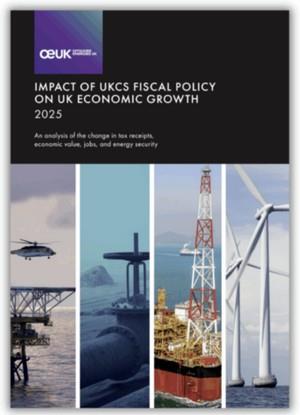
A new report from Offshore Energies UK shows that reforming the windfall tax would add an extra £137 billion to the UK economy, support 23,000 jobs, and unlock much needed investment to reduce reliance on energy imports.
The OEUK analysis released ahead of the Autumn Budget, shows replacing the Energy Profits Levy (EPL) with a new permanent, profit-based mechanism in 2026 would:
- Add £137bn to the economy by 2050
- Secure £41 billion of extra investment in UK energy by 2050
- Support 23,000 additional jobs by 2030
- Unlock £12 billion in additional tax receipts by 2050
The proposal would mean the windfall tax would become a permanent profit-based mechanism activated only when both oil and gas prices exceed a set threshold. The headline tax rate drops from 78% to 40% but the new mechanism would still ensure additional tax revenue is generated when commodity prices are high.
Crucially, it works better for companies by offering greater predictability, a fairer investment environment, and stronger incentives to reinvest in UK projects – unlocking new developments, supporting jobs, and delivering a more stable production outlook through to 2050.

The findings, published in OEUK’s new report, Impact of UKCS Fiscal Policy on UK Economic Growth, show the current fiscal regime exacerbated by the continuation of the Energy Profits Levy (EPL) until 2030, is accelerating decline of offshore energy production by deterring capital investment.
The modelling also shows that without reform of the current fiscal regime, oil and gas production will fall from 2025 levels by approximately 40% within the next five years.
The warning comes after The Office for Budget Responsibility (OBR) revised down its forecast profits for the EPL. It now expects the levy to raise just £21.1 billion between 2023 and 2028, compared to an earlier estimate of £65.7 billion.
The levy is already having a severe impact on the sector, with around 1,000 jobs a month being lost and nine out of 10 supply chain companies looking overseas due to lack of work in the UK.
OEUK’s paper, shared with the Treasury and key ministers, warns that keeping the levy until 2030 may boost short-term tax revenue by £6bn, but will accelerate the North Sea’s decline with wider economic damage.
The EPL is blocking new field development and stalling existing projects. With 282 fields operating, the levy is creating a 'no new investment' scenario, threatening domestic energy supply and long-term growth. With reforms, the sector could pay an extra £12bn in taxes by 2050 as production is maintained.
A range of credible sources estimate the UK will use around 10-15bn barrels of oil and gas between now and 2050 in the event net zero targets are met, however UK producers are only on track to meet 4bn barrels of this demand – and even this is now at risk. With new projects this could reach half of demand, yet without new opportunities to responsibly replace declining fields, the UK risks undermining national energy security and economic resilience.
The analysis is based on fiscal and econometric modelling of the UKCS conducted by OEUK, based on industry data. It also reflects wider analysis of UKCS potential undertaken by the energy analytics firm Westwood Global Energy Group.
OEUK Chief Executive David Whitehouse said:
'It’s set to be a tough autumn budget for households and sectors across the UK, and we recognise the pressures on the economy. Our paper lays bare the choices facing the Chancellor when it comes to domestic oil and gas taxation.
'We are saying reform the Energy Profits Levy to boost national energy production, investment, unlock 23,000 jobs, and add over £137bn to communities – or keep the tax, gain short-term revenue, and risk the North Sea industry’s collapse.
'Without changes to the fiscal regime, UK oil and gas could disappear within years, not decades. That’s a risk we cannot take. We have a range of credible sources showing we will need between 10-15bn barrels of oil and gas while still meeting UK net zero goals. UK producers are only lined up to produce about 4bn of those, and even that target is now at risk. Today, 85% of homes are heated by gas, and while electric vehicle uptake is growing rapidly, around 23 million vehicles on our roads still rely on petrol and diesel.
'By making the most of our homegrown oil and gas while accelerating renewables, the UK can turn one of its greatest assets – the waters around its coast – into a strong driver of economic growth. We need both oil and gas and renewable energy.
'Changing the Energy Profits Levy would allow UK oil and gas operators to continue paying higher taxes when prices are high, while giving them the confidence to invest, knowing those taxes will adjust fairly when prices drop.
'This budget needs big ideas and ambition. Our 200,000-strong industry has the skills and infrastructure to build a homegrown energy future. We now need a fiscal regime and energy policy that can help us deliver it.'
Source: OEUK












